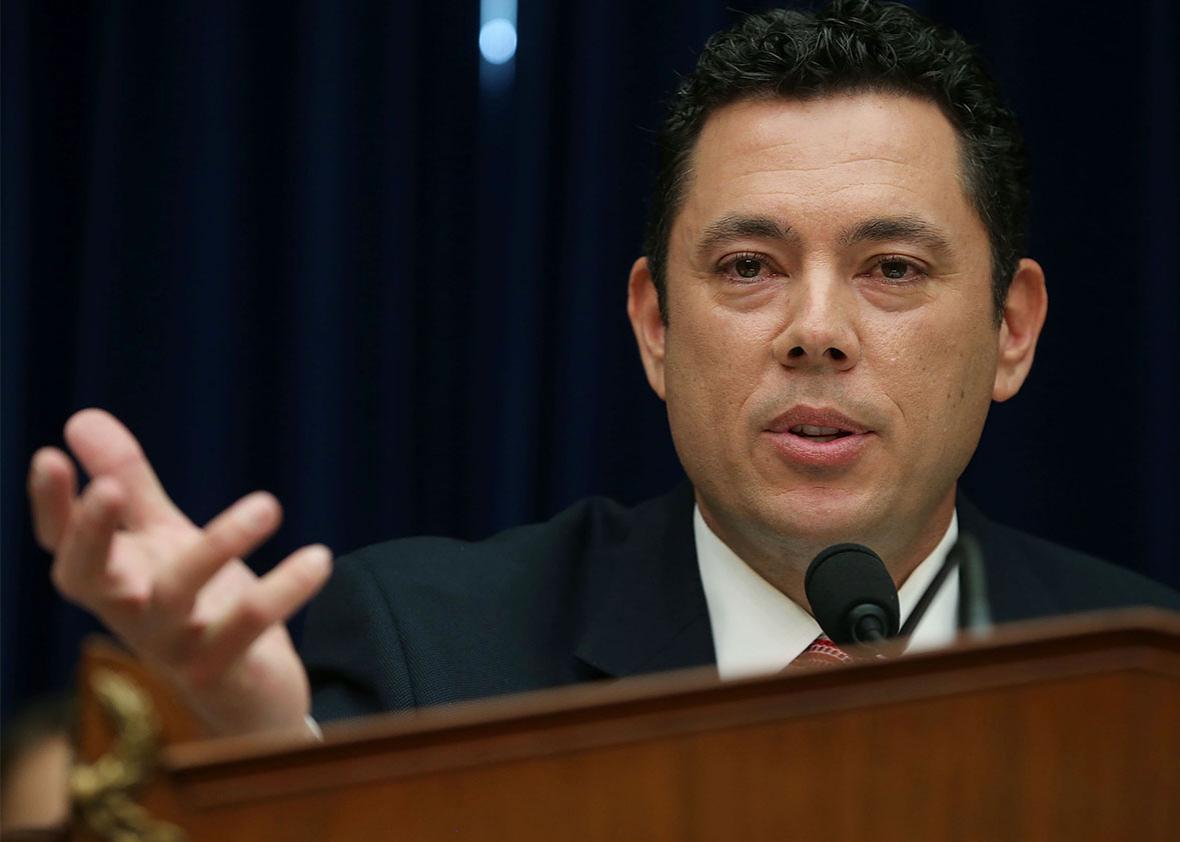Rep. Kevin McCarthy’s ascent to speaker of the House is no longer the cinch that it was supposed to be just one week ago. His admission that the Select Committee on Benghazi has been a successful political enterprise against Hillary Clinton was viewed as an amateurish red flag. He remains the favorite, but his display of public-relations weakness has at least opened the door for a relatively legitimate challenger. Jason Chaffetz, a Utah representative elected in 2008 who chairs the House Oversight and Government Reform Committee, formally announced his bid to replace Speaker John Boehner on Sunday.
Chaffetz is a character, as you might have guessed by his seemingly spontaneous decision to launch a late-stage campaign for the third most senior position in American government. He embodies an unorthodox blend of the hard right and “establishment” elements of the House GOP—a biography, he argues, that would make him a strong choice to “bridge the divide” between warring intraconference factions.
A proto–Tea Partier, Chaffetz won the Republican nomination for his House seat in 2008 by running to the right of an entrenched incumbent. He came to Washington pledging to sleep on a cot in his office, a stunt that numerous freshmen would emulate following the 2010 Tea Party wave election. He loves talking to the media (though, as of publication, his office did not respond to Slate’s request for an interview) and hauling enemies of the conservative movement before his committee for confrontational theatrics. (See last week’s Planned Parenthood hearing for just one dramatic, recent example.)
But the very fact that Chaffetz was handed the chair of such a powerful committee after a modest six years in the House tells you something about his other, more careerist side. Chaffetz, a converted Mormon and consistent supporter of Mitt Romney’s real and imagined presidential campaigns, has some leanings that could be considered not hard-line enough for true Tea Partiers. He is viewed on the right as dangerously amnesty-curious, and he never participated in previous failed efforts to oust Boehner. His greatest heresy in the eyes of conservatives was when he stripped Rep. Mark Meadows of a subcommittee chairmanship earlier this year in a leadership crackdown on caucus rebels that clearly did not work. Though the House leadership returned Meadows his chairmanship several days later, the punitive move was enough for Meadows to start plotting Boehner’s ouster from the chair. Boehner ended up ousting himself before allowing the insurgents the satisfaction.
Chaffetz is the House Republican mullet: establishment in the front, Tea Party in the back. But how would he resolve the basic vote-counting problems over essential funding bills that have plagued Boehner’s term and, according to Chaffetz, would plague McCarthy’s as well?
Host Chris Wallace asked him about this on this week’s Fox News Sunday. Chaffetz—like McCarthy, like Boehner, like any human put in the job of House speaker right now—had no reasonable response, and thus could only speak in repetitive vagaries. Consider the following exchange:
Wallace: President Obama announced on Friday that he will not sign another short-term spending bill when the continuing resolution runs out in December. Would you be willing to risk a shutdown to defund Planned Parenthood?
Chaffetz: Well, look, we’re going to have that discussion internally. We’re—my job is to help put a bill on the president’s desk. The president’s solution is to just borrow more money from China? That’s not a solution. I want to solve this problem.
So, unless we’re actually solving the problem, I have a hard time putting anything over there onto the president’s desk that doesn’t also solve the problem. I want to solve the problem.
Wallace: Respectfully, because you’re maybe the next speaker, would you—how far are you willing to take the fight to defund Planned Parenthood?
Chaffetz: I have—the job as speaker is to unite our party in the House and we’re going to hold the line, from the whole political spectrum. That’s what I want to do. And then we’re going to go fight and we’re going to make that case to the American people.
Unite! Solve! Hold the line! Fight! China!!! When Wallace asked him, similarly, if he would be willing to breach the debt ceiling in order to extract concessions from President Obama, Chaffetz said, “we’re just not going to unilaterally raise the debt limit” and tossed out a couple more China references.
Barring some unprecedented stand-down from House conservatives on Planned Parenthood, here is what will happen in the December funding debate regardless of whether the speaker is McCarthy, Chaffetz, Ted Nugent, or The Ghost of Ronald Reagan: A spending bill that bars federal funding for Planned Parenthood will get filibustered in the Senate. The next speaker, then, could either pass a bill that allows funding for Planned Parenthood with mostly Democratic votes, and risk his job, or lose in the court of public opinion during a government shutdown.
Here is what will happen in the next debt ceiling debate regardless of whether the speaker is McCarthy, Chaffetz, Sarah Palin, or a blue cat from outer space: Conservatives will want major concessions in return for their votes to increase the debt ceiling. Democrats and the White House will say “No.” The next speaker, then, will be faced with a choice of either passing a “clean” debt ceiling bill with mostly Democratic votes, and thus risking his job, or allowing arbitrary global economic catastrophe to ensue.
In their pitches for the job, both McCarthy and Chaffetz mention how they’ll do a better job listening to rebellious conservatives and giving them a seat at the table. At said table, the new speaker will listen to rebellious conservatives demand things that have no chance of success but do augur almost certain doom. The new speaker will then have to say: Interesting perspective … but … no? It doesn’t matter if the figure is establishment or Tea Party, veteran or “fresh-faced.” It’s the institution that constrains. They might as well pick the blue cat from outer space.
